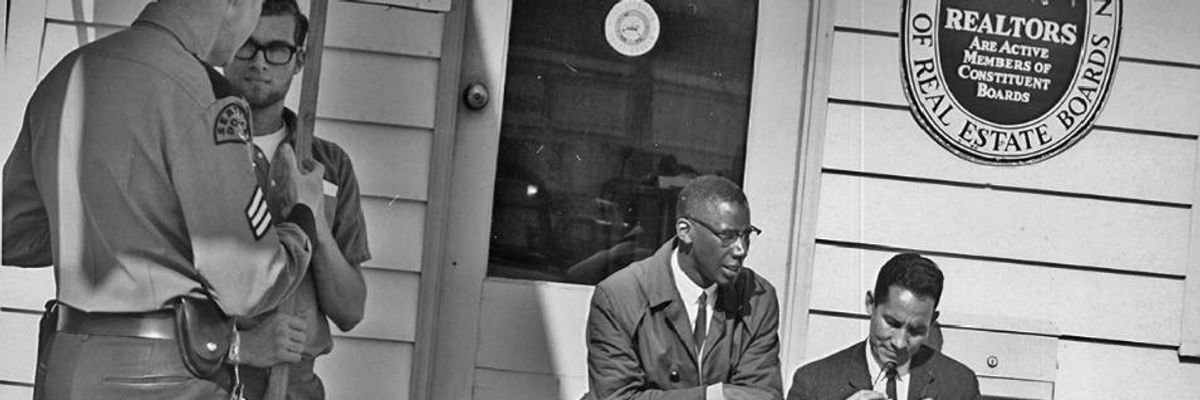Almost lost by the wave of responses to the Supreme Court's decisions last week upholding the Affordable Care Act and allowing gays and lesbians to marry was the significance of the Court's third decision - on housing discrimination.
In a 5-4 ruling, the Court found that the Fair Housing Act of 1968 requires plaintiffs to show only that the effect of a policy is discriminatory, not that defendants intended to discriminate.
The decision is important in the fight against economic apartheid in America - racial segregation on a much larger geographic scale than ever before.
The decision is likely to affect everything from bank lending practices whose effect is to harm low-income non-white borrowers, to zoning laws that favor higher-income white homebuyers.
First, some background. Americans are segregating ever more by income in terms of where we live.
We Interrupt This Article with an Urgent Message! Common Dreams is a not-for-profit news service. All of our content is free to you - no subscriptions; no ads. We are funded by donations from our readers.
Our critical Mid-Year fundraiser is going very slowly - only 1,334 readers have contributed so far. We must meet our goal before we can end this fundraising campaign and get back to focusing on what we do best.
If you support Common Dreams and you want us to survive, we need you now.
Please make a tax-deductible gift to our Mid-Year Fundraiser now!
|
Thirty years ago most cities contained a broad spectrum of residents from wealthy to poor. Today, entire cities are mostly rich (San Francisco, San Diego, Seattle) or mostly impoverished (Detroit, Baltimore, Philadelphia).
Because a disproportionate number of the nation's poor are black or Latino, we're experiencing far more segregation geographically.
Which is why, for example, black students are more isolated today than they were 40 years ago. More than 2 million black students now attend schools where 90 percent of the student body is minority.
According to a new study by Stanford researchers, even many middle-income black families remain in poor neighborhoods with low-quality schools, fewer parks and playgrounds, more crime, and inadequate public transportation. Blacks and Hispanics typically need higher incomes than whites in order to live in affluent neighborhoods.
To some extent, this is a matter of choice. Many people prefer to live among others who resemble them racially and ethnically.
But some of this is due to housing discrimination. For example, a 2013 study by the Department of Housing and Urban Development found that realtors often show black families fewer properties than white families possessing about the same income and wealth.
The income gap between poor minority and middle-class white communities continues to widen. While the recovery has boosted housing prices overall, it hasn't boosted them in poor communities.
That's partly because bank loan officers are now more reluctant to issue mortgages on homes in poor neighborhoods - not because lenders intend to discriminate but because they see greater risks of falling housing values and foreclosures.
But this reluctance is a self-fulfilling prophecy. It has reduced demand for homes in such areas - resulting in more foreclosures and higher rates of vacant and deteriorating homes. The result: further declines in home prices.
As prices drop, even homeowners who have kept current on their mortgage payments can't refinance to take advantage of lower interest rates.
Others who owe more on their homes than their homes are worth have simply stopped maintaining them. In many poor communities, this has caused the housing stock to decline further, and home prices to follow.
Adding to the downward spiral is the fiscal reality that lower housing values mean less revenue from local property taxes. This, in turn, contributes to worsening schools, fewer police officers, and junkier infrastructure -accelerating the downward slide.
All of which explains why housing prices in poor neighborhoods remain about 13 percent below where they were before the recession, even though prices in many upscale neighborhoods have fully rebounded.
And why about 15 percent of the nation's homes worth less than $200,000 are still underwater while just 6 percent of homes worth more than $200,000 are.
Worse yet for poor communities, most of America's new jobs are being created in areas where housing already is pricy, while fewer jobs are emerging in places where housing is cheapest.
The toxic mixture of housing discrimination, racial segregation over wide swathes of metropolitan areas, and low wages and few jobs in such places, has had long-term effects.
A Harvard study released in May suggests just how long. The study tracked several million children since 1980s.
It found that young children whose families had been given housing vouchers allowing them to move to better neighborhoods were more likely to do better in later life - attend college and get better jobs - than those whose families hadn't received the vouchers.
The study points to one solution: housing vouchers that help lower-income families move into better neighborhoods.
It also suggests that federal tax credits to encourage developers to build housing for the poor should be used in racially-integrated communities, rather than mostly in poor ones.
Not incidentally, this is the very issue that sparked last week's Supreme Court's decision on fair housing.
If we want to reverse the vicious cycle of economic apartheid in America, that decision offers an important starting place.



